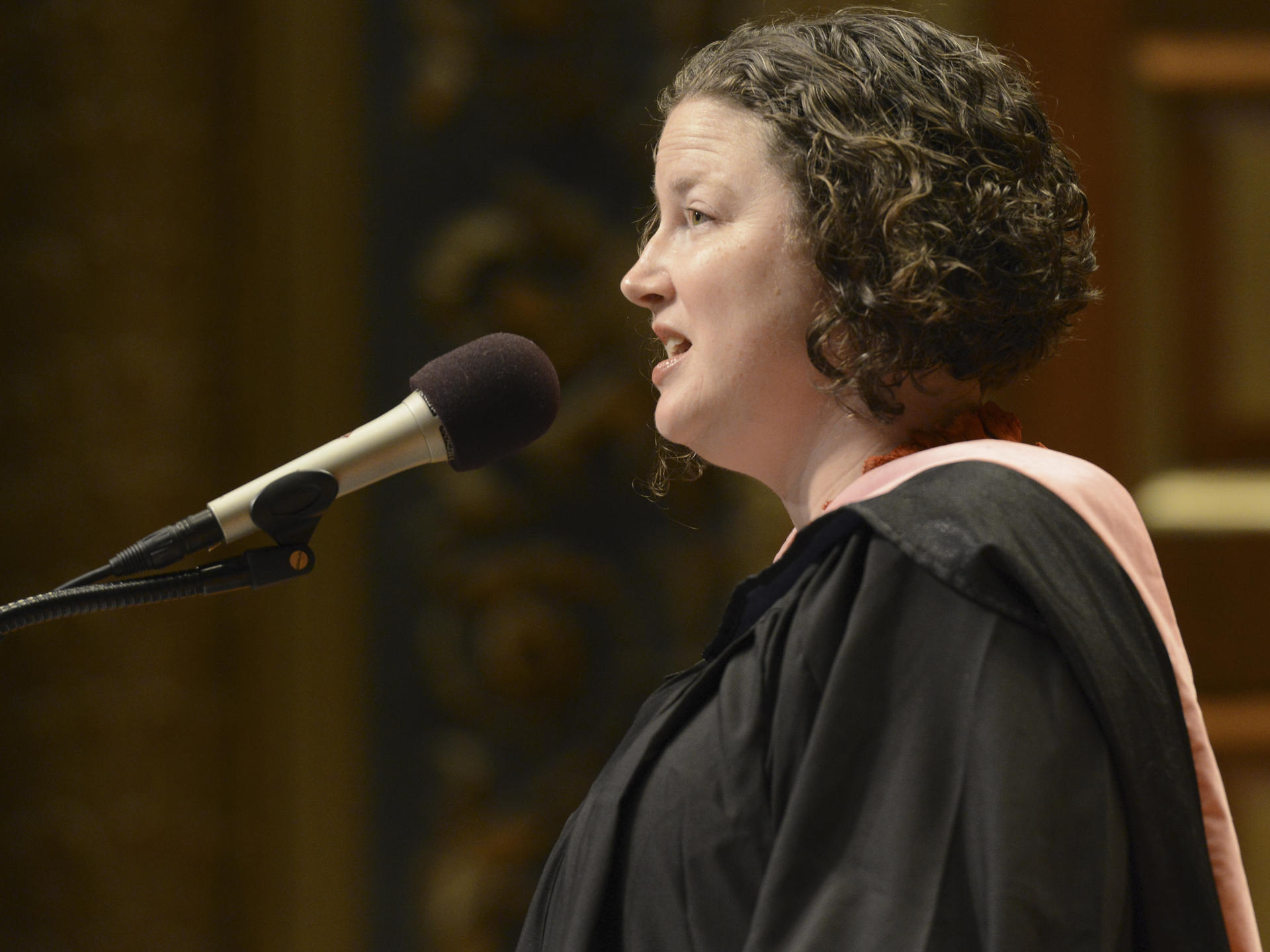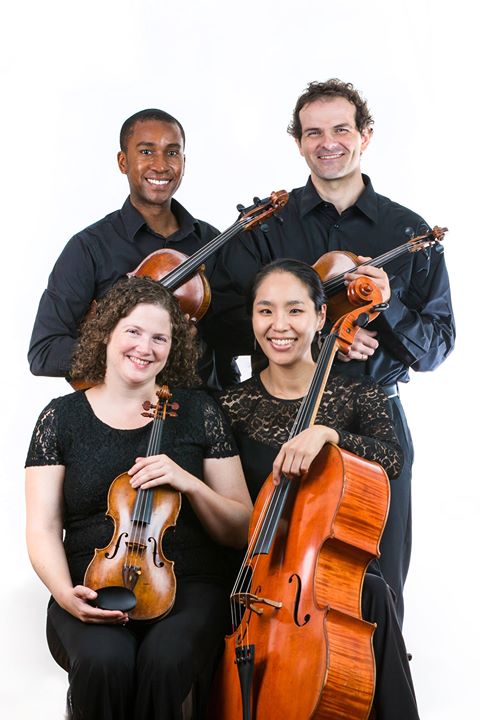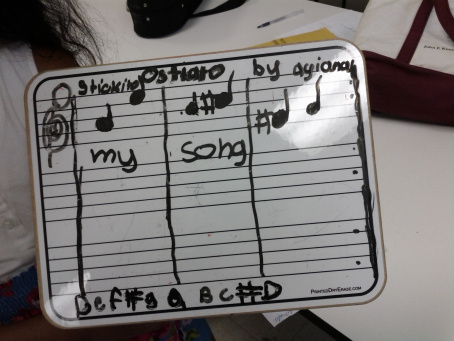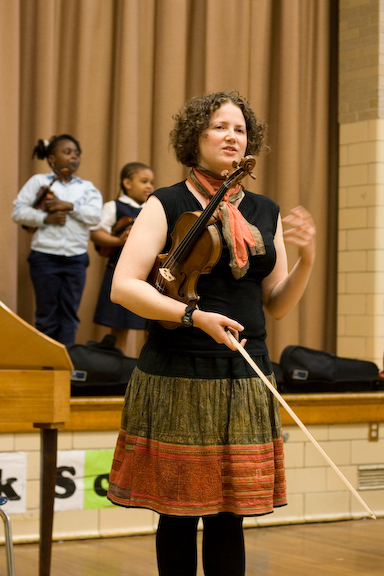Commencement 2017: How Betsy Hinkle Found Her Quartet (And Her Purpose)
Violinist and founder of musiConnects offered these remarks to the graduating Class of 2017 at NEC's 146th Commencement ceremony on May 21, 2017.

It truly is an honor to be speaking to you all today, and to be back in Jordan Hall, one of my favorite places.
Back in 2001 when I was sitting where you are, and proudly walked across the stage, I had no idea where life and music were about to lead me.

I loved how the NEC Master’s Degree let me take lots of electives (I took lots of CI classes as a violin performance major!) and play chamber music each semester, but truthfully two years went by in a flash and I lacked a lot of focus when I graduated.
That May I had coffee with my violin professor Nick Kitchen, who was asking me “what next?” I said what all my friends were saying—play gigs, take orchestra auditions, find some teaching opportunities. He said:
“I really think that chamber music should be your focus—find your string quartet. And I think you’d be a great teacher—find a community-based setting.”
Of course Nick Kitchen has made a wonderful life of performing in a string quartet and teaching at NEC. But this seemed an insurmountable goal to me. String quartet “jobs” are rarely posted in International Musician.
Unbeknownst to me in 2001, the seeds of musiConnects, the organization I founded in 2007, were being planted. My good friend Jesse Holstein who also graduated in ‘01 was headed off to join Community MusicWorks in Providence. It sounded really cool, but I was on a mission to pay rent in Boston.
At first I led a pretty typical Boston freelance life—lots of learning-on-the-job teaching at fancy private schools and driving all over the Northeast to play any gig I was called for. I was doing fairly well, but juggling a lot. And I was constantly searching for my string quartet. I also was increasingly aware that Boston differed greatly from my hometown in Florida as to the availability of high-quality music education.
Wealthy communities have so many opportunities and access, and I thought that Boston Public Schools should have the same, or even more!
Then, while at Apple Hill Center for Chamber Music, immersed in how the power of collaborative music making can bring people from completely different backgrounds together, I read an article in the Chamber Music America magazine about Community MusicWorks, and how they are creating a cohesive urban community through music education and performance.
That’s it, I said, I’m going to do this in Boston. I’m going to create an urban string quartet residency.

All of a sudden my new-found teaching skills had purpose, and I had a reason to even have a string quartet. The next summer I was writing my ideas down, with the help of Heath Marlow, to apply for a grant. I had made contact with an elementary school in Mattapan where there was no general music teacher, no visual arts, no library and no playground. I began in September 2007 with a string quartet of friends who rehearsed weekly and performed our debut at the Mattapan Community Health Center. I taught nine third-grade students the violin, viola, and cello.
By the middle of the year I was developing a chamber music based education model in response to the students’ need to have a unifying approach. All of a sudden I had found something that was so fulfilling to me.
It of course was hard work—learning a whole new language of teaching in this new environment, and raising all the money to do it at the same time! But as you all may come to know,
when you truly love what you are doing, whatever it may be, your “work” can be joyful and fulfilling, even on a daily basis!

Now in our 10th year, musiConnects employs nine resident musicians, six of whom are NEC grads, working with about 100 students in free and low-cost programs. Each of our students gets a private lesson, and as soon as they can play a scale, they are placed in a chamber music group. Our two resident string quartets perform all over Boston, mainly in places like libraries, churches, the post office, and the grocery store. I’ve freelanced with some well-known Boston orchestras, but it is this community-centered chamber music performing that has taken my playing to the next level and helped me find that true flow in performance.
At musiConnects we say that chamber music is a true democracy, where all are leaders and collaborators simultaneously. And this is my advice to you graduates: collaborate!
We’re so much stronger when we work together rather than in competition. The world needs this approach now more than ever!
Be entrepreneurial, yes, but collaborate with existing organizations as well as making your own. Don’t be afraid to forge your own path—even if it’s a variation on a familiar theme—find a way to put your own personal beliefs into whatever you are doing. And most of all, follow your heart and make sure you fully enjoy your music making.
Many congratulations to all, and a warm welcome to the NEC Alumni family!
It is this community-centered chamber music performing that has taken my playing to the next level and helped me find that true flow in performance.
